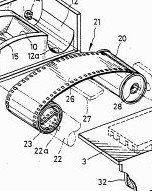
Fuji’s disposable camera patent litigation against Jazz Photo and Benun (Jazz’s owner) is ongoing. (See, e.g., here and here). The lower court granted a preliminary injunction stopping Benun from importing any otherwise infringing disposable cameras that did not originate from camera shells that were first sold in the U.S. Because the ITC has an ongoing Exclusion Order for these products, the defendants challenged the district court’s jurisdiction to enjoin the activity.
Benun tied its jurisdiction argument to the ITC’s grant of jurisdiction. Under 28 U.S.C., 1581(a), the ITC has “exclusive jurisdiction of any civil action commenced to contest the denial of a protest, in whole or in part, under section 515 of the Tariff Act of 1930.” As the CAFC aptly found, however, the statute does not “even vaguely suggest[] that the statutory scheme for protesting a seizure . . . divests a district court of jurisdiction to consider an injunction on goods subject to a general exclusion order.”
According to the CAFC, this distinction makes sense because of the major differences between a general exclusion order and a preliminary injunction to stop patent infringement. Specifically, a general exclusion order is a government action that merely excludes goods from entry. The district court infringement case, however, can lead to damages and attorney fees as well as potential contempt proceedings for violation of a preliminary injunction.
The only thing about reusing the camera body is that it will not be sealed as tightly as when the camera is first made. After awhile light will get into the body and you will end up with crappy pictures. After you keep reusing the same body, sooner or later you won’t even get a picture because of the exposed light that leaks in. Good idea but if you don’t get the quality picture that you want, you end up getting ripped off.
Yikes! OK, I’ll admit I’m a little lost on the legal terms here, but this case does sound very interesting to me. However, I do have to wonder about something – is this case and the precedent it sets going to be relevant for much longer? What I mean is that digital cameras are becoming so affordable and so prevalent among photographers that film cameras may not even be a practical investment anymore, disposable, refurbished, or brand new. Really, how easy is it to find someone who can repair damaged film cameras nowadays? It’s nearly impossible to find parts for some of the older cameras, and even newer film cameras don’t seem to have many advantages over digital. With the availability of photo kiosks at stores and high-quality home printers, will anyone care what the court decides in this case in ten years?
I’m not an expert on law, but this case seems very interesting to me. Fiji has an invested interest in what Jazz is doing to refurbish their disposable cameras. Since Jazz Photo has found a way to successfully repair Fiji’s cameras then Fiji could lose a substantial amount of revenue. If Jazz Photos can offer the reconstructed cameras at a price that beats an original Fiji disposable camera, then consumers will probably buy those cameras instead. However, buying a camera from Jazz would be an environmentally friendly option for consumers who are looking to buy recycled materials. I briefly read over the court’s decision and it seems that so far they agree with Jazz on some principals and Fiji on others. I wonder what will happen in the future when other companies realize they can do exactly what Jazz has done with these available and readily recyclable materials that so many companies are leaving behind when their product’s shelf life is over?
Comments are closed.